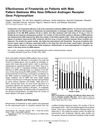1 citations,
January 2019 in “Journal of Research in Medical Sciences” Fewer GGC sequences in the androgen receptor gene improve finasteride treatment for hair loss.
[object Object]  25 citations,
August 2006 in “Human Reproduction”
25 citations,
August 2006 in “Human Reproduction” Oral contraceptives lower testosterone levels in women, especially those with certain genetic traits, and may be linked to increased breast cancer risk.
 23 citations,
December 2005 in “Journal of Investigative Dermatology Symposium Proceedings”
23 citations,
December 2005 in “Journal of Investigative Dermatology Symposium Proceedings” Finasteride works better for baldness in people with shorter gene repeats.
 41 citations,
March 2012 in “Clinical and Experimental Dermatology”
41 citations,
March 2012 in “Clinical and Experimental Dermatology” G allele of AR Stul polymorphism linked to higher hair loss risk, especially in white people.
 2 citations,
July 2015 in “Journal of Cosmetic Dermatology”
2 citations,
July 2015 in “Journal of Cosmetic Dermatology” No clear link between specific gene and hair loss in Mexican brothers.
 January 2016 in “Human & Experimental Toxicology”
January 2016 in “Human & Experimental Toxicology” A specific DNA sequence caused hair loss in male mice by activating immune cells and increasing a certain immune signal.
 54 citations,
November 2001 in “Urology”
54 citations,
November 2001 in “Urology” The length of the CAG repeat in the androgen receptor gene affects the risk and progression of prostate cancer, BPH, infertility, and undermasculinized genitalia.
 195 citations,
July 2005 in “American Journal of Human Genetics”
195 citations,
July 2005 in “American Journal of Human Genetics” Genetic variation in the androgen receptor gene mainly causes early-onset hair loss, with maternal inheritance playing a key role.
 26 citations,
November 2009 in “Journal of Endocrinological Investigation”
26 citations,
November 2009 in “Journal of Endocrinological Investigation” Certain gene variations are not a major cause of male infertility in Nigerian men.
 12 citations,
October 2004 in “Experimental Gerontology”
12 citations,
October 2004 in “Experimental Gerontology” Changes in testosterone and estrogen receptor genes can affect how men age, influencing body fat, hair patterns, and possibly leading to skin disorders.
 6 citations,
December 2020 in “Dermatological reviews”
6 citations,
December 2020 in “Dermatological reviews” COVID-19 may worsen with androgens; anti-androgen drugs could help.
 76 citations,
April 2005 in “Cancer Epidemiology, Biomarkers & Prevention”
76 citations,
April 2005 in “Cancer Epidemiology, Biomarkers & Prevention” E211 G>A gene linked to lower risk of severe prostate cancer and hair loss.
[object Object]  41 citations,
August 2007 in “British Journal of Dermatology”
41 citations,
August 2007 in “British Journal of Dermatology” Men with Kennedy disease have less chance of hair loss.
 100 citations,
September 2017 in “Molecular and Cellular Endocrinology”
100 citations,
September 2017 in “Molecular and Cellular Endocrinology” Male hormones and their receptors play a key role in hair loss and skin health, with potential new treatments being explored.
 46 citations,
October 2012 in “Dermatologic Clinics”
46 citations,
October 2012 in “Dermatologic Clinics” Female pattern hair loss diagnosed by scalp appearance, treated with combined therapies and targeted approaches.
 39 citations,
March 2018 in “Archives of Dermatological Research”
39 citations,
March 2018 in “Archives of Dermatological Research” Androgens may block hair growth signals, targeting this could treat hair loss.
 23 citations,
January 2014 in “International Journal of Biological Sciences”
23 citations,
January 2014 in “International Journal of Biological Sciences” African American men with prostate cancer have more androgen receptor mutations, which may lead to more aggressive cancer compared to Caucasian American men.
 15 citations,
July 2020 in “Dermatologic Therapy”
15 citations,
July 2020 in “Dermatologic Therapy” FPHL is common in women, influenced by genetics and hormones, and can be treated with medications, laser therapy, or hair transplantation.
 11 citations,
January 2015 in “Journal of The European Academy of Dermatology and Venereology”
11 citations,
January 2015 in “Journal of The European Academy of Dermatology and Venereology” Hair loss gene linked to prostate issues.
 4 citations,
January 2013 in “European Journal of Dermatology”
4 citations,
January 2013 in “European Journal of Dermatology” Epigenetic differences affect hair loss in identical Japanese male twins.
2 citations,
August 2022 in “Animals” Different versions of the KRTAP6-2 gene in goats can lead to thinner cashmere fibers.
 April 2023 in “Dermatologica Sinica”
April 2023 in “Dermatologica Sinica” Sex hormones affect hair growth and loss, and treatments for related hair diseases include various medications, hair transplantation, and light therapy.
 36 citations,
July 2014 in “Neuromuscular Disorders”
36 citations,
July 2014 in “Neuromuscular Disorders” A patient with a larger than usual genetic mutation had a broader range of symptoms for a muscle disease.
 60 citations,
January 2007 in “Human Genetics”
60 citations,
January 2007 in “Human Genetics” AR polyglycine repeat doesn't cause baldness.
 16 citations,
December 2014 in “International Journal of Biological Markers”
16 citations,
December 2014 in “International Journal of Biological Markers” Longer CAG and GGN repeats increase alopecia risk, but no significant link to post-finasteride syndrome found.
 January 1995 in “Adolescent and pediatric gynecology”
January 1995 in “Adolescent and pediatric gynecology” Mutations in the androgen receptor gene cause different levels of androgen insensitivity, making it hard to create simple tests for the condition.
 April 2011 in “Vestnik dermatologii i venerologii”
April 2011 in “Vestnik dermatologii i venerologii” Certain gene variations and irregular X chromosome activity may contribute to hair loss in women who can have children.
 December 2010 in “Vestnik dermatologii i venerologii”
December 2010 in “Vestnik dermatologii i venerologii” Certain genes and X chromosome patterns may significantly contribute to the development of hair loss.
 47 citations,
July 2004 in “Journal of Dermatological Science”
47 citations,
July 2004 in “Journal of Dermatological Science” Hair loss in balding individuals is linked to changes in specific hair growth-related genes.
 23 citations,
January 2013 in “Indian Journal of Dermatology, Venereology and Leprology”
23 citations,
January 2013 in “Indian Journal of Dermatology, Venereology and Leprology” FPHL causes hair loss in women due to genetics and hormones; minoxidil and anti-androgens are treatments, and early intervention is advised.



























